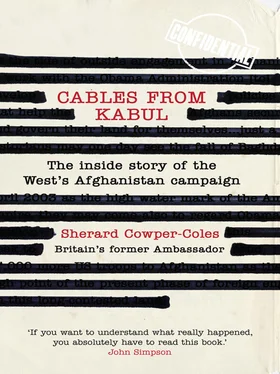In Wilton Park’s ancient halls, and again several weeks later, at yet another conference, this time in the even more hallowed precincts of All Souls College, Oxford, my first doubts crept in. I was sure that progress had been made, and was being made. But I wondered how we would ever complete the enormous task we had set ourselves – of rebuilding the Afghan nation as well as the Afghan state – when none of the three main tools essential for success was yet fit for purpose: neither the Afghan Government in all its different manifestations, at national, provincial or district level; nor the international community, whether organised through the NATO-led International Security Assistance Force (ISAF) for Afghanistan, or through the UN, let alone the European Union; nor Afghanistan’s neighbours, each of which needed to be committed to working in sustained and co-ordinated fashion towards the greater common good of a gradually stabilising Afghanistan, but all of whom were still competing in what amounted to another round of the Great Game. * * The nineteenth-century struggle between Britain’s Indian Empire and the expanding Russian Empire for control over the lands which separated them, especially Afghanistan.
It was at Wilton Park too that I made my first acquaintance with a phenomenon of which I was to see much more in the years ahead: the Afghan conference industry. As with Ireland, or Palestine, or Sri Lanka, or most other conflicts, so Afghanistan’s travails attract what can at times seem like a stage army of caring and committed local and international actors. They travel from conference to conference, endlessly re-examining the entrails of the problem. Such consultations, among governments, and between governments and non-governmental actors, can be valuable, in pooling knowledge and sharing best practice. But when the issues under debate are as intractable as those we face in Afghanistan, such meetings risk becoming ends in themselves, rather than means to the end of solving the problem. And, just occasionally, I have had a sneaking suspicion that some of those taking part – myself included – would feel a bit lost if the problem were actually solved and the conference circus ceased to rotate.
Not everyone to whom I spoke in London that spring was quite as upbeat as the British officers who briefed me. To his credit, one of the more senior Foreign Office officials responsible for South Asia told me, quietly, that he suspected that the Western military intervention in southern Afghanistan had provoked more violence than it had suppressed. His instinct was that the only approach capable of treating the problem would be a political one, involving both the internal and regional participants in the conflict. His quietly owlish demeanour belied a persuasive radicalism far removed from the conventional wisdom of the time.
Similarly worried were some of the more academic analysts in government, especially those more removed by temperament or geography from the pressure and pace of daily military and diplomatic activity in London. They warned me that, gradually, the insurgency in the Pashtun areas of the south and east of Afghanistan was spreading and deepening, and that NATO and its Afghan accomplices were not succeeding in creating stability that was either sustainable or replicable in the insurgency-infected areas where Western forces were not, or no longer, present.
Such gloomy thoughts were, however, far from my mind as I made my final preparations for a posting to which I was greatly looking forward. My team of three Pashtu teachers gradually brought me up to what the Foreign Office language experts call ‘survival level’. They took enormous trouble to equip me as best they could for the linguistic and cultural challenges that lay ahead. One kindly invited me to stay with his family in north-west London for immersion training. All spoke of Afghanistan’s recent history: the overthrow of King Zahir Shah in 1973 by his cousin, Daoud Khan, who established a republic; the Communist coup of April 1978, followed by the Soviet invasion in December 1979; the nationalist regime of the former Communist Dr Najibullah, which was established by the Russians and which survived their departure in February 1989 by three years; the appalling struggle between the warlords from 1992 until 1996; and, finally, the Taliban’s beginnings as a movement of resistance to the depredations of the warlords, and their rule from 1996 until the Western intervention in October 2001. But my teachers played down the horrors which they and their families had experienced, in and out of prison. Each was a talent that would have been better employed back in his homeland rather than, for example, doing dry-cleaning in Shepherd’s Bush.
My final week before departure was spent in the surreal surroundings of a former prep school in the Surrey heathlands, undergoing what is euphemistically called Hostile Environment Training. Overenthusiastic ex-Special Forces instructors took a thinly disguised relish in putting us namby-pamby civilians through the meat grinder. They taught us how to wear a helmet and body armour; how to board helicopters and leave them in a hurry and in a dust storm; how to navigate across country with a compass; how to ‘cross-deck’ or, rather, be violently ‘cross-decked’ from a disabled vehicle to a rescue vehicle; how to apply a tourniquet and staunch a gaping chest wound; and, most terrifying of all, how to cope with kidnap and torture. My efforts to build a relationship in what I assumed was his native language with a very convincing-looking Al Qaeda operative were rudely rebuffed in unmistakable Geordie: ‘Shut the fuck up, willya?’
And then it was time for my final calls in Whitehall before departure. The Permanent Secretaries of the three Whitehall departments directly engaged in the conflict had just returned from the first of several joint visits to Afghanistan. Their report to Ministers had struck an upbeat note. ‘Overall, we are encouraged,’ it had begun, before going on to celebrate the way in which all elements of the British presence in Afghanistan were working together, while noting that, of course, ‘challenges remain’.
This was only the first of scores of reports back to Whitehall by visitors from London that I was to see over the next three years, only a few of which would address head on the scale of the mountain the allied effort in Afghanistan had to climb. Like the ‘Three Tenors’ (as the Permanent Secretaries had been dubbed, with that precious wit beloved of Whitehall), most such reports chose to accentuate the positive. Cautious optimism was the dominant theme. The civilian and military sides of the British effort in Helmand and Kabul were more ‘joined up’ than ever. We were at or approaching the turning point. There were no awkward questions about the credibility (or even existence) of a wider strategy for stabilising the whole country. Such was the pressure not to sound defeatist that all of us indulged from time to time in such self-congratulatory vacuities, as if the fact that most members of the UK team were facing in roughly the same direction, and talking to each other, was a matter for celebration.
At my last meeting in the Foreign Office before leaving for Heathrow, I mentioned to a senior official that my instinct was that we had made a strategic mistake in piling into Helmand the previous summer. He brushed my worry aside, assuring me: ‘Well, we are there anyway, and there is nothing we can do about it now, so there is no point in worrying about it.’
* The nineteenth-century struggle between Britain’s Indian Empire and the expanding Russian Empire for control over the lands which separated them, especially Afghanistan.
Chapter 2
First Impressions
In 2007, the Foreign Office still felt it could afford to give VIP treatment to a new British ambassador travelling out from London to take up his or her appointment. An expensively hired limousine would convey him from home to Heathrow, he would use the VIP lounge once there, and the flight out would be in first class. And soon after he arrived he would send a telegram of First Impressions back to the Foreign Secretary in London.
Читать дальше












